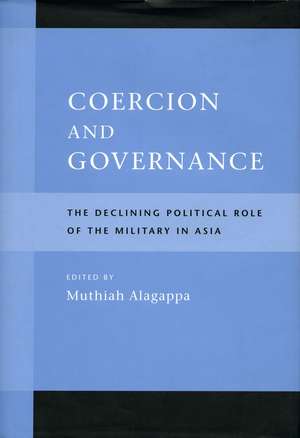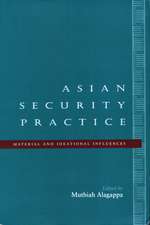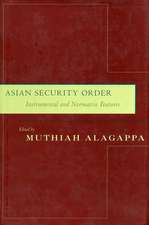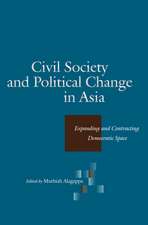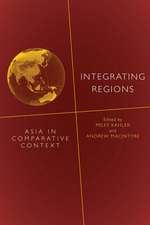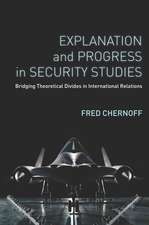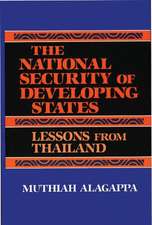Coercion and Governance: The Declining Political Role of the Military in Asia
Editat de Muthiah Alagappaen Limba Engleză Paperback – 31 aug 2002
This far-ranging volume offers both a broad overview of the role of the military in contemporary Asia and a close look at the state of civil-military relations in sixteen Asian countries. It provides in-depth discussion of civil-military relations in countries where the military still continues to dominate the political helm as well as others where, in varying degrees, the military is disengaging from politics. Conceptually, the study connects the explanation for the changing relationship of the military to the state to the processes associated with the construction of nation, state, and political system, as well as the development of state capacity, economic growth, and change in the international system.
The book argues that the key to understanding civil-military relations in Asia and elsewhere is the role of coercion, in state and nation building and in the exercise of political authority. As coercion in these processes increases or decreases, so does the political power and influence of the military. Civilian supremacy requires superior political, ideational, moral, and economic power translated into strong institutions that can regulate the military and limit its role in governance.
A key finding of the volume is that, overall, the political power and influence of the military in Asia, though still considerable in some countries, is on the decline. At present only Burma and Pakistan are under military rule, though the military is the central pillar of the totalitarian regime in North Korea. The number of Asian countries under civilian rule has increased dramatically. However, the relationship between the state and the soldier is not a settled issue, and in democratizing countries, civil-military relations is still a contested domain that is being redefined incrementally, often through struggle. The study concludes that, in the long term, the power of the military will continue to decline, and that the growing dominance of democratic civilian control in Asia is likely to endure.
The book argues that the key to understanding civil-military relations in Asia and elsewhere is the role of coercion, in state and nation building and in the exercise of political authority. As coercion in these processes increases or decreases, so does the political power and influence of the military. Civilian supremacy requires superior political, ideational, moral, and economic power translated into strong institutions that can regulate the military and limit its role in governance.
A key finding of the volume is that, overall, the political power and influence of the military in Asia, though still considerable in some countries, is on the decline. At present only Burma and Pakistan are under military rule, though the military is the central pillar of the totalitarian regime in North Korea. The number of Asian countries under civilian rule has increased dramatically. However, the relationship between the state and the soldier is not a settled issue, and in democratizing countries, civil-military relations is still a contested domain that is being redefined incrementally, often through struggle. The study concludes that, in the long term, the power of the military will continue to decline, and that the growing dominance of democratic civilian control in Asia is likely to endure.
| Toate formatele și edițiile | Preț | Express |
|---|---|---|
| Paperback (1) | 411.13 lei 3-5 săpt. | |
| Stanford University Press – 31 aug 2002 | 411.13 lei 3-5 săpt. | |
| Hardback (1) | 1124.18 lei 6-8 săpt. | |
| Stanford University Press – 31 aug 2002 | 1124.18 lei 6-8 săpt. |
Preț: 411.13 lei
Nou
Puncte Express: 617
Preț estimativ în valută:
78.67€ • 81.29$ • 65.45£
78.67€ • 81.29$ • 65.45£
Carte disponibilă
Livrare economică 26 februarie-12 martie
Preluare comenzi: 021 569.72.76
Specificații
ISBN-13: 9780804742276
ISBN-10: 0804742278
Pagini: 624
Dimensiuni: 178 x 254 x 33 mm
Greutate: 1.07 kg
Ediția:1
Editura: Stanford University Press
Colecția Stanford University Press
ISBN-10: 0804742278
Pagini: 624
Dimensiuni: 178 x 254 x 33 mm
Greutate: 1.07 kg
Ediția:1
Editura: Stanford University Press
Colecția Stanford University Press
Recenzii
“This outstanding book will have a lasting impact on the study of civil-military relations and of the comparative politics of Asia. It is by far the best collection of case studies of civil-military relations I have read, for any part of the world.”—Larry Diamond, Hoover Institution
Notă biografică
Muthiah Alagappa is Distinguished Senior Fellow at the East-West Center. He is the editor of Asian Security Order: Instrumental and Normative Features (Stanford, 2003), Coercion and Governance: The Declining Political Role of the Military in Asia (Stanford, 2001), Asian Security Practice: Material and Ideational Influences (Stanford, 1998), and Political Legitimacy in Southeast Asia: The Quest for Moral Authority (Stanford, 1995).
Textul de pe ultima copertă
“This outstanding book will have a lasting impact on the study of civil-military relations and of the comparative politics of Asia. It is by far the best collection of case studies of civil-military relations I have read, for any part of the world.”—Larry Diamond, Hoover Institution
Descriere
This far-ranging volume offers both a broad overview of the role of the military in contemporary Asia and a close look at the state of civil-military relations in sixteen Asian countries. It discusses these relations in countries where the military continues to dominate the political realm as well as others where it is disengaging from politics.
